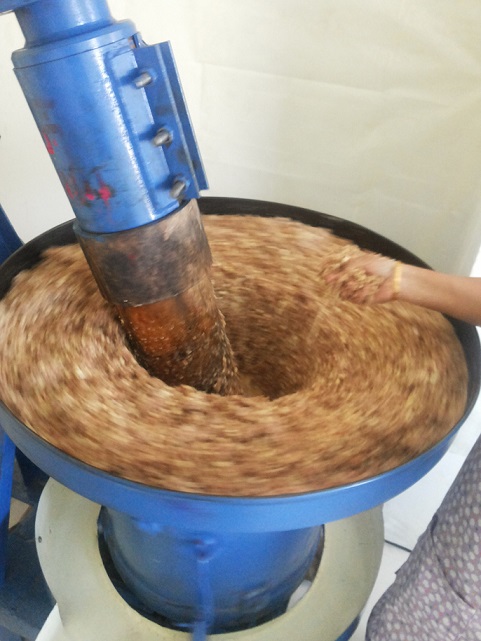About Ghana

Traditional Ghani Technology
The oilseeds and subsequently the expressed oil are held in a scooped circular pit in the exact centre of a circular mortar made of stone or wood. In it works a stout, upright pestle which descends from a top curved or angled piece, in which the pestle rests in a scooped-out hollow that permits the pestle to rotate, eased by some soapy or oily lubricant. Today the single angled piece takes the form of two shorter pieces pinioned or chained together. The bottom of the lower angled piece is attached to a load-beam; one end of the load-beam rides around the outside of the barrel, while the other is yoked to the animal. The load-beam is weighted down with either heavy stones or even the seated operator. As the animal moves in a circular ambit, the pestle rotates, exerting lateral pressure on the upper chest of the pit, first pulverizing the oilseed and then crushing out its oil.
So why must we include organic cold pressed oils in our cooking?
1) They retain healthy anti-oxidants that are otherwise destroyed by heat. These anti-oxidants fight harmful free radicals and prevent the growth of tumors.
2) Cold pressed olive oil is rich in Vitamin E, which has anti-inflammatory, healing properties. It is a good source of oleic acid which strengthens the immune system.
3) Cold pressed coconut oil, despite its bad reputation, contains lauric acid, which fights against harmful pathogens. This compound is also found in human breast milk. According to this article, “Coconut oil contains a lot of medium chain triglycerides, which are metabolized differently and can have therapeutic effects on several brain disorders.”
4) Rujuta Diwekar, in her article for Outlook recommends cold-pressed filtered groundnut oil. “At low temperatures, the fatty acid bonds in the groundnut don’t get destroyed, keeping its heart-protecting abilities intact, along with vitamins and minerals. Groundnuts, with their high Niacin (of the Vitamin B family) content, help stabilise blood sugars”, she writes.
